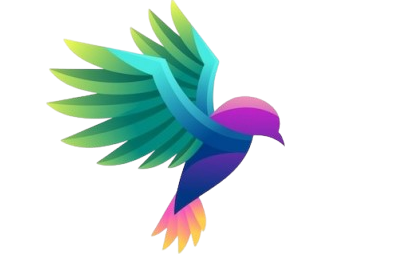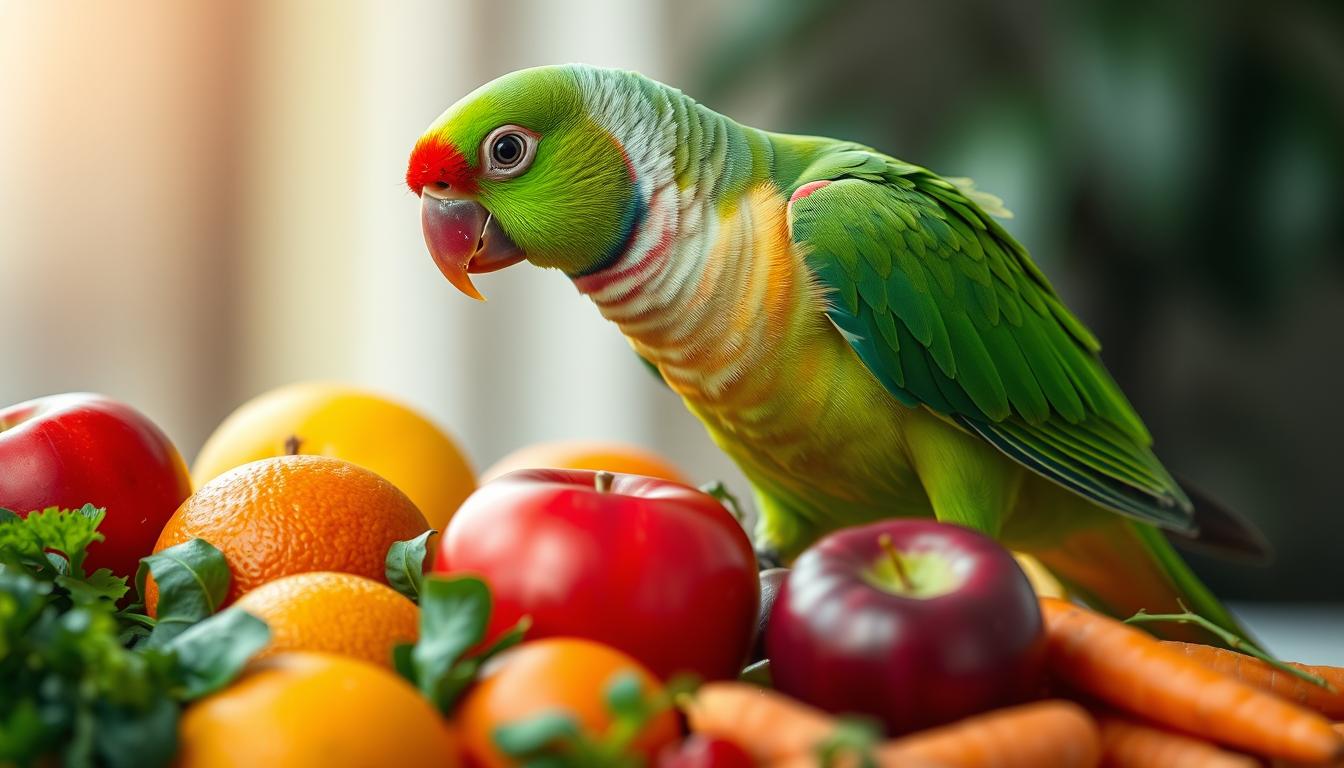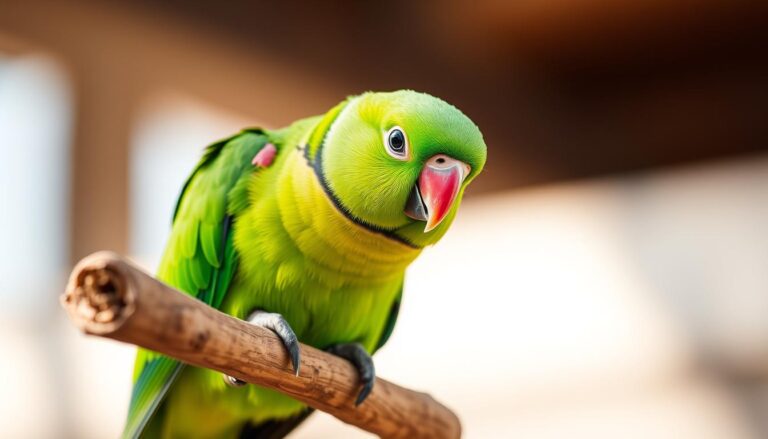Diet of Rose-Ringed Parakeet
The diet of rose-ringed parakeets is key to their health and long life. Knowing what parakeets need to eat is vital for pet owners. This section will look at foods that match their natural diet in the wild. It will also stress the need for a balanced diet.
By understanding a healthy diet for rose ringed parakeets, owners can improve their pets’ well-being.
Understanding the Natural Habitat of Rose-Ringed Parakeets
Rose-ringed parakeets live mainly in Africa and Southern Asia. They love forests, woodlands, and grasslands. These places help shape their wild parakeet diet.
In forests, they eat fruits and seeds. Grasslands give them different plants to eat. When seasons change, they adjust their diet to find the best food.
Watching how they live in nature helps us care for them at home. Knowing what they need in the wild helps us feed them right. This makes sure they get a diet that’s similar to what they would find in the wild.
The Importance of a Balanced Diet for Rose-Ringed Parakeets
A balanced diet is key for rose-ringed parakeets’ health. It helps them stay active and happy. They need carbs, proteins, vitamins, and minerals to thrive.
Without the right nutrients, parakeets can get sick. They might start plucking their feathers or feel tired. Giving them enough vitamins A, D, and E, and proteins is important.
Feeding parakeets right keeps them healthy and cheerful. They love to play and be around people when they’re well-fed. Making sure they get what they need makes them great friends.
Common Foods in a Rose Ringed Parakeet Diet
Seeds and grains are key in a rose-ringed parakeet’s diet. These rose ringed parakeet diet foods give the bird the nutrients it needs. Several types of seeds are good for parakeets, each with its own benefits.
Some popular parakeet food types include:
- Millet: A favorite, millet seeds are full of carbs and give lots of energy.
- Sunflower Seeds: High in fat, sunflower seeds help make energy.
- Canary Seeds: They offer a balanced mix of nutrients, good for health.
Choosing a quality parakeet grain mix is important for a balanced diet. A mix of seeds ensures the bird gets all the vitamins and minerals it needs. It’s vital to mix different seeds to keep the bird happy and healthy.
Supplementing the Rose Ringed Parakeet Diet with Nutritional Additives
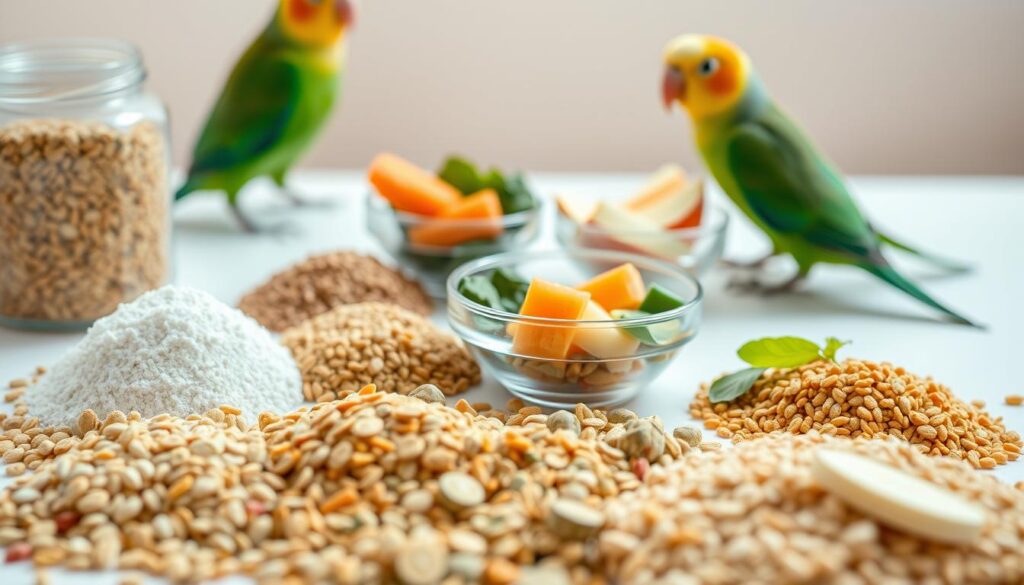
Keeping rose-ringed parakeets healthy often means adding nutritional supplements to their diet. Parakeet pellets and good commercial bird foods are key. They make sure parakeets get all the nutrients they need.
Choosing the right parakeet food is important. Look for brands with a mix of seeds, grains, and vitamins. A good diet combines fresh foods with parakeet pellets full of nutrients.
It’s vital to read food labels carefully. Choose commercial bird foods with whole grains and natural ingredients first. This means the food is made with care, giving parakeets the nutrients they need. Adding these foods to their daily diet makes their diet more complete.
Using pelleted diets with fresh foods is very beneficial. Pellets have the right amount of vitamins and minerals, preventing deficiencies. They help ensure parakeets get the balanced nutrition they need to stay healthy.
Understanding Dietary Needs of Young vs. Adult Parakeets
Young rose-ringed parakeets have different dietary needs than adults. A good young parakeet diet is key for their growth. Adult parakeets eat a variety of seeds and greens, but young ones need more protein.
At first, young parakeets need soft foods. This helps them get ready for solid foods. Give them chopped veggies and special young bird pellets. These foods are full of vitamins and help their feathers grow strong.
Weaning is also important for young parakeets. They start eating solid foods while getting help from their caregivers. Watching adult parakeets helps them learn how to eat right.
When they grow up, their diet needs to change. They should eat a mix of seeds, fruits, and veggies. Knowing what young parakeets need helps them stay healthy and happy.
How to Properly Feed Your Rose-Ringed Parakeet
Feeding your rose-ringed parakeet right is key to their health and happiness. It’s important to think about a few things to make sure they get the best care. One thing to remember is portion control. You need to give the right amount of food each day, based on their age, how active they are, and their health.
How often you feed them is also important. Feeding them twice a day helps set a routine. This routine is good for their health.
Also, keep the food clean and fresh. Giving them clean water every day is important for their hydration. The look of the food matters too. Bright colors in fruits and veggies can make them more interested in eating.
Keeping the dishes clean is also key. Wash the bowls and dishes often to stop bacteria from growing. This keeps your pet healthy. Tailoring the feeding to their needs makes mealtime a good experience for both you and your parakeet.
Common Mistakes to Avoid in Feeding Rose-Ringed Parakeets
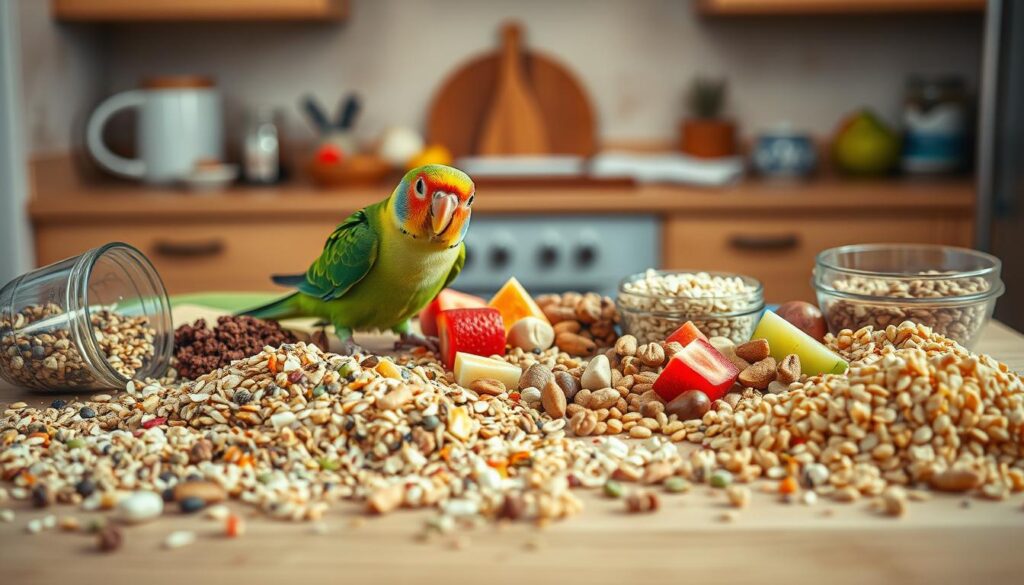
Feeding mistakes can harm the health of rose-ringed parakeets. Many owners make errors that lead to nutritional issues. Knowing these mistakes helps ensure a balanced diet for your bird’s health.
One big mistake is overfeeding. Owners think giving lots of food keeps their birds healthy. But, too much food can cause obesity and health problems. It’s important to feed the right amount.
Another issue is relying only on seeds. Seeds are tasty for parakeets, but they lack essential nutrients. Adding fruits and vegetables to their diet is key to avoiding diet pitfalls.
- Neglecting to provide fresh water daily
- Assuming all fruits and vegetables are safe
- Ignoring the importance of calcium and mineral supplements
Avoiding these common mistakes helps create a healthy diet for your parakeets. Learning about proper feeding ensures your bird stays healthy and happy.
Signs of Nutritional Deficiencies in Rose-Ringed Parakeets
Spotting signs of nutrition deficiency in rose-ringed parakeets is key to their health. These signs can show up as bad feathers, changes in behavior, or weight changes. It’s important for owners to watch for these parakeet health indicators.
Common signs of nutritional deficiencies include:
- Feather Issues: Dull, ragged, or missing feathers may indicate a lack of essential nutrients.
- Behavioral Changes: Increased lethargy or changes in vocalization may signal underlying health concerns.
- Weight Fluctuations: Sudden weight loss or gain can be alarming and is often linked to dietary insufficiencies.
Regular vet visits are vital for monitoring parakeet health. A vet can spot any deficiencies early and suggest diet changes. This helps keep these colorful birds healthy and happy.
How to Transition Your Rose-Ringed Parakeet to a Healthier Diet
Changing a rose-ringed parakeet’s diet needs a careful plan. It should be done slowly to avoid stress and make the bird comfortable. Start by adding a little of the new food to their usual meals.
This gradual approach helps the parakeet get used to new tastes and textures. Introduce fresh fruits, veggies, and fortified pellets one at a time. This way, you can see which foods they like best.
Watching how the parakeet reacts to new foods is important. Some birds might not want to try new things at first. If they don’t like it, try giving them the new food in a different way. Maybe in a separate dish or as part of a game.
Being patient and consistent is key. Keep trying different foods until you find ones they enjoy. This way, you can make sure they get all the nutrients they need.
Also, think about what the parakeet likes when planning their meals. Adding foods they love can make the transition easier. By doing this, you can help them enjoy a balanced diet that’s good for their health.
